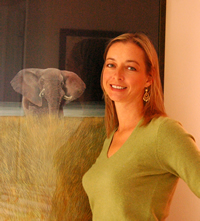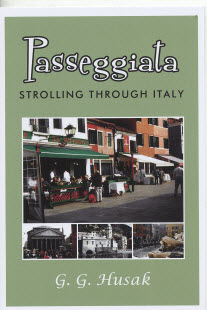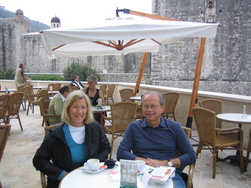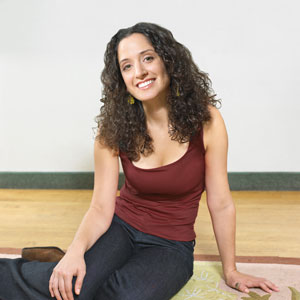Archive for the ‘guest bloggers’ Category
Guest Blogger and Book Giveaway: Sybil Baker, Author of The Life Plan
 Fresh off Freelance Writing Week, we’re going to keep the writing theme going just one more day with a guest post from Sybil Baker, author of The Life Plan.
Fresh off Freelance Writing Week, we’re going to keep the writing theme going just one more day with a guest post from Sybil Baker, author of The Life Plan.
Sybil is the first author to appear here through blog tours with WOW: Women On Writing, and hopefully there will be many more to come.
This book tour caught my eye in particular as Sybil is an ex-expatriate who spent 12 years teaching in South Korea; she says her experiences as an expat greatly shape her writing, and I was looking forward to seeing that come through in her book.
And indeed it does.
 Her novel, The Life Plan, is about Kat Miller’s carefully planned life falling apart and her efforts to salvage it, which include going to Thailand with Dan, her unemployed husband of five years. Dan has recently been spending a little too much time at yoga class with a beautiful classmate, so when he suddenly signs up for a massage course in Asia, Kat just had to gowith him. With scenes in Washington D.C., Bangkok, and Chiang Mai, the book traces Kat’s search to have it all, whatever that ultimately means.
Her novel, The Life Plan, is about Kat Miller’s carefully planned life falling apart and her efforts to salvage it, which include going to Thailand with Dan, her unemployed husband of five years. Dan has recently been spending a little too much time at yoga class with a beautiful classmate, so when he suddenly signs up for a massage course in Asia, Kat just had to gowith him. With scenes in Washington D.C., Bangkok, and Chiang Mai, the book traces Kat’s search to have it all, whatever that ultimately means.
When I joined the blog tour, Sybil kindly sent me the electronic version of her book to have a look-see, and I may or may not be guilty of minimizing “work” computer windows to catch a peek at what Kat and Dan are up to throughout my workday. I was hooked from page one, and I think this is why e-books are dangerous for me. It’s *way* too easy to click over to the book while I’m supposed to be working!
Sybil has also kindly offered a signed print copy of The Life Plan to one lucky Bleeding Espresso reader; to be eligible for the book drawing:
Leave a comment on this post at or before 11:59 p.m. (Italy time) on Sunday, April 5.
Now here’s Sybil:
The Expatriate Writer in the Post Millennium
 When I moved to South Korea in 1995, the internet was just getting started, email was a few years a way, and beepers—not cell phones—were the “must have” item by my students. Once a month I would write a long letter on notebook paper and then photocopy it before mailing the copies to family and friends. My family called once after we arrived, but when my father got the phone bill, he decided he could live with letters.
When I moved to South Korea in 1995, the internet was just getting started, email was a few years a way, and beepers—not cell phones—were the “must have” item by my students. Once a month I would write a long letter on notebook paper and then photocopy it before mailing the copies to family and friends. My family called once after we arrived, but when my father got the phone bill, he decided he could live with letters.
Those first few years in South Korea, my life was not much different from expatriate writers twenty years ago. I was cut off from my own country, immersed in a very different culture, and forced to communicate using a language I barely knew. I didn’t have a computer, and instead wrote in my notebook. I didn’t know any other aspiring writers, which was a nice change from the States, where it seemed at least two other people at every party I went to wanted to be a writer. I could work on my writing in a strange quiet, within the demands of living in a different country but also without the “noise” of distractions in the States.
Another expatriate writer, Robert Eversz, who lived in Prague during that time said the same thing when I interviewed for an essay on American expatriate literature for The Writers’ Chronicle. His Nina Zero novels take place in LA, which he visited once or twice a year. But Eversz told me that if he lived in LA he wouldn’t be able to write about it because he’d had sensory and information overload. For those first seven years in Korea I wrote about the States—the South that I had left and the characters that lived in that world.
Then in about 2002, I finally wanted to write about Korea and the other countries I visited. By then I had a computer and my notebook was more for planning than anything else. I was living in Seoul, which was becoming more international by the day and less isolating. I could watch Sex and the City, Friends and other popular American TV shows, and the internet connected me to music, movies, and the news that I’d been away from. Suddenly, the advantages of being an expatriate writer were becoming liabilities. I had no one around to read my work and give me feedback. Even with the internet, it was hard to keep up with new work and writers in the States, to figure out where to send my work out. And sending work out from Korea was complicated, time-consuming, and expensive. My self-imposed exile as a writer was no longer freeing but isolating. To resolve this problem, in 2003 I enrolled in Vermont College’s low residency MFA program. I was able to enjoy living abroad but also become connected with writers in the States, to have my work looked at seriously, to catch up on the books I missed.
When I graduated with my MFA in 2005, Seoul was one of the most wired countries in the world, Koreans watched TV shows on their cell phones, and I could chat with my family for free and see them on video using Skype or MSN messenger. Literary journals were starting to appear online, and I’d met a few other writers in Seoul. I now live in the States again, but life for expatriate writers is much different. Blogs allow writers to keep up with the publishing industry, to read about new work and trends. Many journals now take electronic submissions. Online journals are increasing in number and quantity. Online writing communities are sprouting up everywhere.
It’s much easier for an expatriate writer to feel connected to other writers in the States and around the world. In many ways that’s a good thing, although if you fantasize about living as an American expatriate removed from the United States writing scene, you should probably unplug your computer, turn off your cell phone, and take out pen and paper because otherwise, almost wherever you live, you won’t be able to duplicate the expat writer’s life of Hemingway or James Baldwin or Paul Bowles. These days, even my writer friend living in Kabul has internet.
Thanks so much Sybil!
Now I ask all of you: Do/did you have a “life plan”?
Remember to leave a comment to be eligible to win a copy of The Life Plan!
Guest bloggers: Lisa Steinke and Liz Fenton
Not only is it great for keeping up with old friends, it’s also fabulous for meeting friends of friends and creating new friendships. I stumbled upon ChickLitisNotDead.com in just that way and ended up “meeting” Lisa Steinke and Liz Fenton, authors of I’ll Have Who She’s Having.
I visited their blog and read a blurb about their book and immediately asked if they’d be interested in guest posting here. I can’t wait to read the book (it’s currently in Customs of all places…one book! Come on Dogana!), but for now, here is Lisa:
Liz and I have been friends for *gulp* 22 years. And we’ve been through everything, together. We’ve sported unibrows, mustaches and Lee press on nails. We’ve worn mom jeans, balloon pants and stir ups. There was even a brown braided belt phase I’m not particularly proud of.
It was in college that we first started talking about writing a book. And then we graduated, began our careers, Liz got married, I continued my search for Mr. Right, Liz had a baby and then finally, it all came together. I was in yet another serious relationship with a commitment-phobe that I thought was going to be “the one” and Liz was preggers with baby #2 and we went for it. We wrote the book!
And we’re incredibly proud of the fact that during the writing process, we only tried to kill each other once!
 I’ll Have Who She’s Having is the story of a man who comes between a desperately single and a very married sister. Liz wrote the character, Kelly, who is questioning her marriage and her entire life after becoming a stay at home mom. I wrote the character of Kate, the single sister, who after getting dumped on her bootie yet again, continues to look for love in all the wrong places. The book is told from the alternating points of view of Kate and Kelly and is full of laugh out loud moments as the sisters struggle to figure out who is going to make them happy.
I’ll Have Who She’s Having is the story of a man who comes between a desperately single and a very married sister. Liz wrote the character, Kelly, who is questioning her marriage and her entire life after becoming a stay at home mom. I wrote the character of Kate, the single sister, who after getting dumped on her bootie yet again, continues to look for love in all the wrong places. The book is told from the alternating points of view of Kate and Kelly and is full of laugh out loud moments as the sisters struggle to figure out who is going to make them happy.
We are proud to call I’ll Have Who She’s Having a Chick Lit book. Our belief that the genre isn’t buried six feet under–like many in the publishing world claim– inspired our blog ChickLitIsNotDead.com. Our tag line is “two girls who believe that books with high fashion and happy endings never go out of style.”
We know that there are tons of women (and even men- we don’t discriminate) who want to read a new and campy version of the classic story of boy meets girl, sweeps her off her feet and they live happily ever after. We like to say that our sassy spin and crass sense of humor make our book entertaining. You’ll read about everything from a GP (golden pu**y) to a dremail (drunken email) to a karaoke contest gone way bad.
But at the end of the day, despite the crazy, slapstick antics our characters go through, we believe Kate and Kelly are relatable. We feel we brought a realistic vulnerability to the characters through our own life experiences (although we are not Kate & Kelly, we assure you!) So, whether you’re single or married or somewhere in between, we hope you’ll be able to connect with one or even both of the sisters.
Xoxo, Lisa & Liz
Do you read Chick Lit? What’s your favorite Chick Lit book?
Buon weekend!
Guest Post: Author of Passeggiata, GG Husak
 Today I have the pleasure of introducing you to G.G. Husak, author of Passeggiata: Strolling through Italy. G.G. and her husband Al make a yearly pilgrimage to Italy in March, enjoying the Bel Paese from the inside, and this book is the result of their trips.
Today I have the pleasure of introducing you to G.G. Husak, author of Passeggiata: Strolling through Italy. G.G. and her husband Al make a yearly pilgrimage to Italy in March, enjoying the Bel Paese from the inside, and this book is the result of their trips.
G.G. writes that Italy has become comfortable and familiar for them “even though we know ours is a fringe position and that, as visitors, we have the luxury of a romantic and imaginative perspective. Still, we are pleased that we can stand at a counter in a café in a small town and drink cappuccino with the local folks, pretending that, in our jeans and black jackets, we blend in. We feel as if we belong, at least for the moment.”
The book is a collection of tales from their stroll, or passeggiata, through various Italian cities and towns, and the following is
G.G.’s take on Italian coffee:
Returning to Italy means a return to the best espresso and cappuccino in the world. One of our simple pleasures is watching the owner of a small café prepare the espresso or cappuccino as we lean over the bar. We smell the coffee beans, feel the steam, and hear the froth of milk.
Instead of a complex language describing the size, additions, and ratios of our drink ingredients, in Italy, we simply ask for a caffé or cappuccino, not wet or dry, not small or large.
We know that if we sit at a table in a cafe and have our coffee served to us, it may cost several dollars, but if we stand at the counter, drinking the same coffee without table service, it will be 50 cents.
 We know that ordering “coffee” or “caffè” will bring us a cup of espresso, rather than American style coffee. If we want a lighter drink, coffee with milk, we order a cappuccino or latte.
We know that ordering “coffee” or “caffè” will bring us a cup of espresso, rather than American style coffee. If we want a lighter drink, coffee with milk, we order a cappuccino or latte.
We know that Italians drink espresso, rather than cappuccino or latte, later in the day, adding milk only in the mornings. Waitpeople have gotten used to visitors like us enjoying both in the afternoons. In a café we know to leave a small coin beside the cup as a tip, even if we are served standing.
We are accustomed to seeing loose sugar in a bowl on the bar with a couple of communal spoons, no little bags of sanitized sugar and no sugar substitutes. There is also no mess, no torn wrappers, no empty powdered cream containers, no paper to-go cups and no wooden or plastic stir sticks. You get a cup, a saucer and a spoon.
Occasionally an office or shop worker from down the block will come in and get a small tray of coffees, presumably for coworkers, and leave with a round tray and several ceramic espresso cups. Later they will bring back the empties.
Recently in Rome, I was shocked to see my first ever take-out coffee shop, with a sign advertising cups “to-go.” I guessed that they were targeting the tourists. But thinking of the waste of paper and plastic that we have unfortunately come to see as normal in many coffee shops at home, I can’t imagine that Italy would ever go down that road.
What do you think?
Do Starbucks and the like have a chance in Italy?
Who by Fire by Diana Spechler: Guest Post and Book Giveaway
 Are you a member of GoodReads?
Are you a member of GoodReads?
I am, and I recommend it highly.
You can compare books with friends and also get great recommendations, as I did recently from Lara when I received an update on her bookshelf via email regarding the book Who by Fire by Diana Spechler:
I recently gave two books five stars. Then, when I started thinking about writing these reviews, I thought about offering the books to anyone who wanted them…but then realized that I simply cannot part with Who By Fire.
I was intrigued (seriously, go read Lara’s description and review), and then just a few hours later, I happened to get a message from Diana herself in my inbox about reviewing her book! Of course I jumped at the chance, but since I won’t receive the book for a little while (love you Poste Italiane!), I asked Diana if she’d like to guest post and offer a free copy to one lucky reader, and here we are.
CONTEST RULES:
1. In order to be eligible to win a free copy of Diana Sprechler’s book, Who by Fire, just leave a comment on *this* post by 11:59 p.m. CST (Italy time) on Tuesday, December 9, 2008.
2. Sorry, the contest is only open to readers with a US shipping address, but please feel free to leave comments for Diana regardless; there’s another guest post and contest coming next Tuesday for international readers as well!
Welcome Diana!
———-
Moving to New York City is sort of like moving to a Third World country with excellent tap water. First and foremost, you must learn the language: walk-up, the L, bodega, Nolita. Then you have to lower your standards: You dine with mice. You live in a closet. During rush hour, you stand in the subway, resting your face in a stranger’s armpit.
You accept jobs you haven’t had since college, or jobs you wouldn’t have touched in college: You are twenty-seven years old and tending bar on the day shift. You are twenty-seven years old and walking a bouquet of poodles. You are twenty-seven years old and standing outside a comedy club, freezing your ass off for five hours on a Sunday, forcing fliers on innocent passersby.
“Comedy show!” you scream in their faces. “Everyone likes to laugh,” you shriek without cracking a smile. You are like a telemarketer in person. You are uncharacteristically aggressive. You are horribly annoying. Your job title is part of the foreign, exotic-sounding New York City lexicon:
You are a barker. You are one who barks.
I moved from Rhode Island to Manhattan two years ago, an impulsive, passionate, I’m-going-to-do-something-for-myself-and-pretend-I-usually-don’t decision, the kind that comes from reading too many women’s magazines filled with columns called Take a YOU Break and All About You, You Fabulous Woman!, a decision I called “liberating,” by which I meant, “similar to jumping off a sky-scraper.” I had no money, no plan, no job, just an East Village apartment that a friend said she’d sublet to me while she spent six months in Michigan.
 For the first few weeks, I holed up in that apartment, surfing Craig’s List, first scanning the teaching jobs, then sliding gradually down the employment totem pole until I landed on an ad that said, “HOT girls needed to work the door at a HOT comedy club. Email pictures.”
For the first few weeks, I holed up in that apartment, surfing Craig’s List, first scanning the teaching jobs, then sliding gradually down the employment totem pole until I landed on an ad that said, “HOT girls needed to work the door at a HOT comedy club. Email pictures.”
I called one of my friends and read her the ad. “Can you believe it?” I said. “It’s like, demoralizing. I would never!”
Always one to look on the bright side, my friend pointed out, “It’s better than stripping. Or escorting.”
I didn’t tell her that I was broke and desperate enough to have considered both, that the only thing stopping me was my fine breeding, a.k.a. my mother’s voice in my head: “Sex is not a recreational activity…You can’t go to synagogue with your knees exposed!…The only man you can trust is your father.” But working at a comedy club was a far cry from prostitution. After all, I would be promoting the arts. That was honorable. And it was kind of sort of like participating in the arts, which is what I should have been doing. I’d had a novel in the works for several years, and I was starting to worry that by living in New York, I was only inviting distraction from it.
After I hung up with my friend, I realized I had forgotten to ask her if I could pass for HOT.
“Whatever,” I said aloud, and I attached a picture of myself to an email: Please consider me for the comedy club position.
Apparently, I was HOT enough to be a barker, which is sort of like being STRONG enough to arm-wrestle your aunt. My new ten-dollar-an-hour job entailed standing in front of the club and distributing fliers to everyone who crossed my path. If someone brought one of my fliers (bearing my initials) to a show, he or she would get a discount at the door, and I, in addition to my hourly wage, would get a cut of the ticket price. If a passerby seemed particularly interested, I was supposed to try to sell him an actual ticket on the spot. Again, I would get a cut of the ticket price. The potential seemed limitless.
My “training” was to spend a few minutes watching other barkers bark.
Mostly, barkers are aspiring comics, who forego the hourly wage and work in exchange for stage time. Some of them made me laugh: “Comedy show,” one of them yelled. “If you miss it, you’ll get cancer.” Others were the kind of guys who cat-call girls at the mall (sexual harassers dressed up as barkers): “Hey, gorgeous. What you got goin’ on tonight? You like comedy, baby?”
I watched, cringed, took mental notes. And then I was on my own.
Back in college, in the indulgent days of lit theory classes, years before I knew I would grow up to be a barker, I threw around words like “othering” and “exoticizing,” methods of alienation employed by the majority to render the minority either ridiculous or invisible. As a barker in the Village, like an American tourist in a Third World country, I was “other.” I may as well have been wearing a fanny pack.
Some passersby treated me with disdain (“I hate comedy. I seriously hate it. Who are you anyway and why are you talking to me?”), some with glee (“Aww,” one girl said to her boyfriend. She pointed at me. “She’s so cute!”). One old woman pinched my cheek. A few people hugged me and gave me their business cards. One man dropped to his knees and kissed my hands. A group of German tourists posed for a picture with me like I was Ronald McDonald. Some drunk guy tried to grind up against me, dancing to techno music no one else could hear.
“I feel like you’re about to have sex with me,” I told him, alarmed.
He made no attempt to correct me.
But by the end of my first shift, I had sold thirteen tickets, and unloaded well over a hundred fliers.
“Wow!” my boss said. “Thirteen is amazing.”
Of course I was amazing. I was way over-qualified. I had a master’s degree, for the love of God. Social skills. Life experience. And furthermore, I was HOT. The manager counted out seventy-six dollars for me, ten for each of the five hours I had worked, plus two per ticket sold. I went straight to the bank, raising my checking account balance to one hundred fifty-six dollars. I was only one thousand forty-four dollars away from a month’s rent. I was making it in New York City.
But my first shift as a barker had also happened to be the last summer-like fall day. I had worn jeans and a tight white T-shirt, my hair pushed back from my head with sunglasses. I still had my tan from the beach. I had sold every one of those thirteen tickets to men.
“Lonely men,” my boss pointed out. “The loneliest men in the Village.”
The day of my second shift, the temperature dropped into the twenties. No one is HOT in a wool hat and a down coat. No one is HOT in snow boots. My teeth chattered.
“C-c-comedy show,” I called. “If you don’t have p-p-plans tonight…”
People rushed by me, faces tucked into collars, hats pulled low over their foreheads, numb hands jammed into pockets. No one wanted to stop and talk. Even the lonely men wanted to get home and climb under the covers.
I sold four tickets.
The next week, I sold two per shift. The temperature continued to plummet. So did my motivation. During my shifts, I spent most of the five hours fighting hypothermia, distracting myself by talking to the comics that came by the club looking for stage time, or to the people who would come out of the bar next door to smoke cigarettes on the sidewalk. My sales dwindled to zero. I sipped coffee from the bodega on the corner. I breathed warm air onto my freezing fingers.
“We’re losing money on you,” my boss said. “I know it’s cold out, but you have to step it up. Maybe you need to work on your pitch?”
My pitch: “Great comedy show tonight, guys….Hey, do you like stand-up comedy?…Hi there. What do you have going on tonight?”
It wasn’t my pitch that needed work.
“I think I need to work on my life,” I said.
Being around aspiring comedians all day had become an uncomfortable reminder that I was ignoring my own dreams, neglecting my writing, not finishing the novel I desperately wanted to finish.
So I renounced my career as a barker.
I’d like to say I never had to work a dumb job again because my writing career took off and soared high above the New York City skyline. I’d like to say I’m living in a brownstone on the Upper East Side, that I’m VIP at every lounge in the city, that I can afford Broadway shows and boutique jewelry and Prada bags and all the other things that Manhattan dangles like diamond-encrusted carrots before the twitching snouts of the terminally broke.
But in reality, I picked up a job waiting tables at an Israeli restaurant, where I was literally the only American, where the Mexican guys who shaved shawarma off the spit spoke Hebrew, and the rabbi who checked the lettuce for bugs spoke Spanish.
But here’s the thing about arriving in a strange land: Eventually, it stops being strange. Within a few months of living in New York, I knew rudimentary Hebrew and rudimentary Spanish. I could read the subway maps with fluency. I knew which bodega sold the cheapest toilet paper, what to spray to kill roaches, and which bars had the best happy hour specials. And yeah, eventually, I did finish my novel.
Best of all, though, whereas New York makes some people hard, it’s made me a little softer. Or at least, a little more empathic. Whenever I see a tourist poring over a map, I ask if he needs help. At bars and restaurants, I tip 25%. And whenever I pass a barker in the Village or Times Square, I stop, take her flier, look her in the eye and thank her. And then I ask whoever I’m with if he thinks she’s as HOT as I am.
———–
Thanks so much Diana!
Remember to leave a comment for a chance to win a copy of
P.S. If you aren’t eligible for the contest but stll want to leave a comment, please note that you’re “international” so I don’t include your name in the drawing. Thanks! And be sure to check out The Scribbit Message Board for lots more giveaways!
love thursday: the wandering chopsticks edition
Last week when I put out the call for heart photos for Love Thursday, one of my favorite food bloggers, Wandering Chopsticks, who specializes in Vietnamese and Chinese cuisine, responded in a big way. Below is a collage of some of the best Wandering Chopsticks heart photos with links to the corresponding posts (including recipes!) at the bottom.
Does this make up for no What’s Cooking Wednesday this week or what?! Please *do* check out the recipes and the rest of this fabulous blog!
And now, food is love:
1. Vietnamese Wedding Prepartions and Ceremony 2. Chicken Pot Pie with Cilantro Biscuits 3. Chicken Pot Pie with Cilantro Biscuits 4. Sinh To Dam (Vietnamese Aloe Vera Shake) 5. A Not-So-Romantic Fondue Dinner, Although It Can Be If You Want 6. Vietnamese Wedding Prepartions and Ceremony 7. Chicken Pot Pie with Cilantro Biscuits 8. Shogun Japanese Restaurant – Pasadena 9. Lavender Biscuits
Happy Love Thursday everyone,
and if you have any heart photos to share, send them over!
















